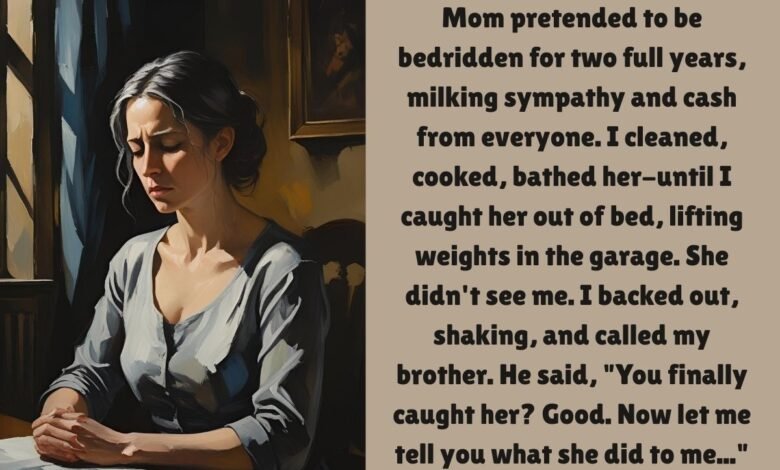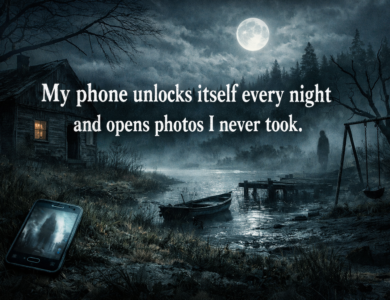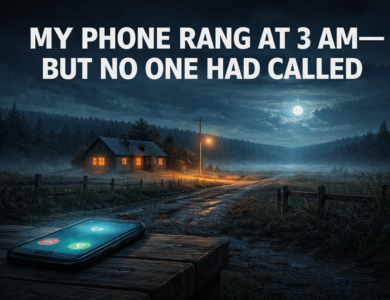
Mom pretended to be bedridden for two full years, milking sympathy and cash from everyone. I cleaned, cooked, bathed her—until I caught her out of bed, lifting weights in the garage.
She didn’t see me. I backed out, shaking, and called my brother. He said, “You finally caught her? Good. Now let me tell you what she did to me…”
At first, I thought he was joking. Or maybe just being dramatic, like always. But his voice had this edge—flat, tired, almost relieved. He’d been waiting for this moment, and I had just handed it to him.
“She did the same to me after Dad left,” he said. “Told me she couldn’t walk. I was fifteen. She said it was nerve damage from stress. I skipped baseball, skipped dances, even skipped school some days. Took care of her for over a year. Then one day I came home early and found her dancing in the living room to some cheesy aerobics tape.”
I sat on the edge of the guest bed in her house, still trembling. “Why didn’t you say anything?”
“Because the moment I called her out, she cried so hard I felt like I was the bad guy. Then she threatened to tell people I pushed her. Said no one would believe me. I just… walked away.”
I didn’t know what to say. My hands felt dirty. All that care, the sleepless nights, the arguing with my husband because he thought I was being “too much of a martyr.” The two years I spent basically living at her house, putting her before everything and everyone. And all that time, she’d been faking.
I stayed quiet the rest of the day. When she called me for her “meds” that night, I went through the motions, acting like nothing had changed. She thanked me with her usual fragile smile, playing the victim like it was second nature.
But I knew. And once you know, you can’t un-know.
That night I went back to the garage. The lights were off, but her dumb little pink dumbbells were right where I’d seen her using them. There were protein bars on the shelf, a yoga mat rolled up in the corner, even a tiny Bluetooth speaker.
She had a whole secret life.
The next morning, I started quietly packing my things. My work clothes, laptop, chargers, makeup. It was time to go home, to my real life—the one I’d been neglecting. My husband deserved better. My kids barely remembered what weekends with me felt like.
As I packed, I thought about what my brother had said. How she manipulated him, too. It didn’t feel like a fluke anymore. It felt like a pattern.
I stopped by the nursing agency I’d been paying out of pocket to help during the week. The receptionist looked shocked when I said I wanted to cancel the services.
“Oh, but she’s not well, is she?” the woman asked. “She insisted she needed the extra hours. Said you were exhausted and she was afraid of falling.”
I didn’t know what to say. Mom had conned them too.
Instead of explaining, I handed her the forms and said, “She’s recovered. Drastically.”
Then I got in the car, drove straight to my brother’s place, and asked him to meet me for coffee.
He was already there when I arrived, stirring his tea and looking at nothing in particular. When I sat down, he didn’t even wait for small talk.
“She’s not gonna stop,” he said. “You know that, right?”
“But why?” I asked. “Why fake being sick? What does she even get out of it?”
He looked at me, a tired smile on his face. “Control. She likes having people orbit her. Feeling needed. Feeling pitied.”
I stared into my cup. “And the money?”
“That too. Dad left her enough to live on, but she’s always been greedy. You were paying for everything, weren’t you?”
I nodded. “Groceries. Rent. Her pills, even though half of them were probably sugar.”
He chuckled, a dry sound. “And yet she always played poor.”
We sat in silence for a while. It was a sunny day. People walked past us with shopping bags and dogs, smiling and living their lives.
“I feel stupid,” I finally said.
“Don’t,” he replied. “You loved her. That’s not stupid.”
I stayed with him for a few nights, catching up with my own kids over video calls and slowly easing back into work. My husband was cautious—understandably—but I promised him I’d start putting us first again.
A few days later, I got a text from Mom:
“Feeling very dizzy. Could be a stroke. Please come quick.”
I stared at the screen. I could feel my heart start to race, that automatic panic response she’d trained into me. But then I pictured her in the garage, casually doing curls like she was training for a triathlon.
I didn’t go.
I waited a few hours, then texted back:
“Call an ambulance if you’re really sick. I won’t be manipulated anymore.”
She didn’t reply.
The next day, my brother got a message too:
“Your sister’s abandoned me. I’m scared. Please help.”
We compared texts. Same tone. Same guilt trip. We decided not to respond. If she was truly unwell, she’d get help. If not, she’d be forced to face the fact that her grip on us was slipping.
Two days later, I got a call from her neighbor, Mrs. Tinsley. She was sweet, old, and too curious for her own good.
“I just saw your mother walking around outside with a laundry basket,” she said. “She looked fine to me. Said she was finally ‘finding her strength again.’ Isn’t that lovely?”
I thanked her and hung up. My hands didn’t even shake this time.
I started writing things down. Every memory, every moment from the last two years that now made sense. The times she refused to let me go home. The way she’d cry when I brought up taking her to a doctor. How she always made sure the neighbors saw me carrying her groceries.
It wasn’t just selfishness. It was a full-on act. And I had played my role too well.
My brother and I agreed to confront her, but not with anger. Just truth. If we’d gone in screaming, she’d collapse into her martyr routine. So we did it like a meeting. Sat her down at her kitchen table and told her we knew.
Her reaction was… strange.
First, she denied everything. Said she had “good days” and “bad days,” and maybe we caught her on a good one.
Then, when she saw we weren’t buying it, she went quiet. Her eyes got watery. Not from guilt—from fear.
“I didn’t want to be alone,” she said. “After your father left… I didn’t know who I was. When I’m sick, people care. When I’m strong, they leave.”
I wanted to feel bad for her. But I just felt tired.
“You don’t have to fake illness to be loved,” I told her. “You just have to be honest.”
But she shook her head. “I was honest once. It got me nothing.”
My brother and I left after that. We didn’t yell. We didn’t slam doors. We just walked away.
For the first time in my life, I felt like I was the one choosing the distance.
Weeks passed. She kept texting, but the messages grew shorter and less dramatic. Eventually, she asked to see the grandkids.
I told her she could visit us, but only if she walked in under her own power. No wheelchairs. No neck braces. No sob stories.
She came. Wearing makeup. Hair done. Walking just fine.
We didn’t talk about the past. Not that day. But she helped set the table. Laughed with my daughter. Told my son a joke that made him giggle.
I realized she could be a good mom. When she wasn’t playing victim, when she wasn’t manipulating. The woman she pretended to be for two years was exhausting. But the real her—the one who finally showed up—was still in there.
It’s been six months now. She still slips sometimes, tries to hint at “aches” or “spells,” but I don’t bite. And oddly enough, neither does she anymore. It’s like she knows the old game doesn’t work.
We’re building something new. It’s not perfect. But it’s real.
The truth is, some people fake weakness to feel strong. But real strength comes when you stop pretending—and start living honestly, even if that means standing alone for a while.
If you’ve ever had to walk away from someone who drained the life out of you, just know this: you’re not cruel. You’re brave. And sometimes, that’s the only way healing begins.
If this story spoke to you, please share it. Someone out there might need to know they’re not alone.







